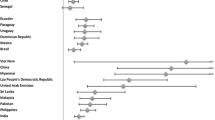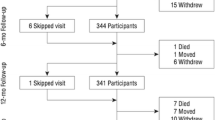Abstract
Background
Angina and depression are common in ischemic heart disease (IHD), but their association remains understudied.
Purpose
This study was conducted in order to evaluate the association of 1 year change in depression with change in patient-reported outcomes of stable angina.
Methods
Five hundred sixty-nine stable angina patients completed the Seattle Angina Questionnaire and Patient Health Questionnaire (PHQ) at baseline and 1 year. Participants were divided into four groups: not depressed, new onset of depression at 1 year, remitted at 1 year, and persistently depressed. Associations between depression and angina symptoms were evaluated using regression models.
Results
Compared to those not depressed, newly depressed participants reported more angina (β = −11.7, p < 0.001) and physical limitations (β = −11.8, p < 0.001) and lower treatment satisfaction (β = −15.03, p < 0.001) and quality of life (β = −15.4, p < 0.001). Persistently depressed participants reported physical limitations (β = −7.4, p < 0.05), lower treatment satisfaction (β = −10.1, p < 0.001), and poorer quality of life (β = −10.03, p < 0.001).
Conclusions
Changes in depression scores and angina outcomes were significantly associated.


Similar content being viewed by others
References
Natl J, The Regence Foundation: Living Well at the End of Life Poll, 2011.
Clancy C, Collins FS. Patient-Centered Outcomes Research Institute: The intersection of science and health care. Sci Transl Med. 2010; 2: 37cm18.
Washington AE, Lipstein SH. The Patient-Centered Outcomes Research Institute—Promoting better information, decisions, and health. N Engl J Med. 2011; 365: e31.
Members WG, Roger VL, Go AS, et al. Executive summary: Heart disease and stroke statistics—2012 update. Circulation. 2012; 125: 188-197.
Clayton TC, Lubsen J, Pocock SJ, et al. Risk score for predicting death, myocardial infarction, and stroke in patients with stable angina, based on a large randomised trial cohort of patients. BMJ. 2005; 331: 869.
Beltrame JF, Weekes AJ, Morgan C, Tavella R, Spertus JA. The prevalence of weekly angina among patients with chronic stable angina in primary care practices: The Coronary Artery Disease in General Practice (CADENCE) Study. Arch Intern Med. 2009; 169: 1491-1499.
Kimble LP, Dunbar SB, Weintraub WS, et al. Symptom clusters and health-related quality of life in people with chronic stable angina. J Adv Nurs. 2011; 67: 1000-1011.
Ruo B, Rumsfeld JS, Hlatky MA, et al. Depressive symptoms and health-related quality of life: The Heart and Soul Study. JAMA. 2003; 290: 215-221.
Whang W, Shimbo D, Kronish IM, et al. Depressive symptoms and all-cause mortality in unstable angina pectoris (from the Coronary Psychosocial Evaluation Studies [COPES]). Am J Cardiol. 2010; 106: 1104-1107.
Rumsfeld JS, Magid DJ, Plomondon ME, et al. History of depression, angina, and quality of life after acute coronary syndromes. Am Heart J. 2003; 145: 493-499.
Spertus JA, McDonell M, Woodman CL, Fihn SD. Association between depression and worse disease-specific functional status in outpatients with coronary artery disease. Am Heart J. 2000; 140: 105-110.
Fihn SD, Bucher JB, McDonell M, et al. Collaborative care intervention for stable ischemic heart disease. Arch Intern Med. 2011; 171: 1471-1479.
Spertus J, Winder J, Dewhurst T, et al. Development and evaluation of the Seattle Angina Questionnaire: A new functional status measure for coronary artery disease. J Am Coll Cardiol. 1995; 25: 333-341.
Seattle Angina Questionnaire (SAQ) Retrieved 1/28, 2014 from http://www.outcomes-trust.org/instruments.htm#saq.
Syrkin AL, Pechorin EA, Drinitsina SV. [Validation of methods assessing the quality of life in patients with stable angina pectoris]. Klin Med (Mosk). 2001; 79: 22-25.
Gibbons RJ, Abrams J, Chatterjee K, et al. ACC/AHA 2002 guideline update for the management of patients with chronic stable angina—Summary article: A report of the American College of Cardiology/American Heart Association Task Force on practice guidelines (Committee on the Management of Patients With Chronic Stable Angina). J Am Coll Cardiol. 2003; 41: 159-168.
Spertus JA, Jones P, McDonell M, Fan V, Fihn SD. Health status predicts long-term outcome in outpatients with coronary disease. Circulation. 2002; 106: 43-49.
Kroenke K, Spitzer RL, Williams JB. The PHQ-9: Validity of a brief depression severity measure. J Gen Intern Med. 2001; 16: 606-613.
Kroenke K, Strine TW, Spitzer RL, et al. The PHQ-8 as a measure of current depression in the general population. J Affect Disord. 2009; 114: 163-173.
Razykov I, Ziegelstein RC, Whooley MA, Thombs BD. The PHQ-9 versus the PHQ-8—Is item 9 useful for assessing suicide risk in coronary artery disease patients? Data from the Heart and Soul Study. J Psychosom Res. 2012; 73: 163-168.
Blumenthal JA, Lett HS, Babyak MA, et al. Depression as a risk factor for mortality after coronary artery bypass surgery. Lancet. 2003; 362: 604-609.
Stata Corp. Stata: Release 11. Statistical Software. College Station, TX: Stata Corp LP; 2009.
Carney RM, Freedland KE, Eisen SA, Rich MW, Jaffe AS. Major depression and medication adherence in elderly patients with coronary artery disease. Health Psychol. 1995; 14: 88-90.
Rozanski A, Blumenthal JA, Davidson KW, Saab PG, Kubzansky L. The epidemiology, pathophysiology, and management of psychosocial risk factors in cardiac practice: The emerging field of behavioral cardiology. J Am Coll Cardiol. 2005; 45: 637-651.
Carney RM, Freedland KE, Miller GE, Jaffe AS. Depression as a risk factor for cardiac mortality and morbidity: A review of potential mechanisms. J Psychosom Res. 2002; 53: 897-902.
Glassman AH, O'Connor CM, Califf RM, et al. Sertraline treatment of major depression in patients with acute MI or unstable angina. JAMA. 2002; 288: 701-709.
Acknowledgments
This work was supported by the Department of Veterans Affairs (VA), Veterans Health Administration, Health Services Research and Development (HSR&D) Service, IHI 02-062. Dr. Trivedi is supported by a VA HSR&D Career Development Award (CDA 09-206). VA Puget Sound Health Care System and the VA Palo Alto Health Care System provided resources to support this research. The views expressed in this manuscript are those of the authors and do not necessarily represent the opinions of the Department of Veterans Affairs. Dr. Trivedi and Dr. Sun had full access to all of the data in the study and take responsibility for the integrity of the data and the accuracy of the data analysis.
Authors’ Statement of Conflict of Interest and Adherence to Ethical Standards
Authors Drs. Ranak Trivedi, Martha Gerrity, John Rumsfeld, John Spertus, Haili Sun, Melanie Doak, Linda Lucas, and Stephan Fihn as well as Ms. Mary McDonell declare that they have no conflict of interest. All procedures, including the informed consent process, were conducted in accordance with the ethical standards of the responsible committee on human experimentation (institutional and national) and with the Helsinki Declaration of 1975, as revised in 2000.
Author information
Authors and Affiliations
Corresponding author
About this article
Cite this article
Trivedi, R., Gerrity, M., Rumsfeld, J.S. et al. Angina Symptom Burden Associated with Depression Status Among Veterans with Ischemic Heart Disease. ann. behav. med. 49, 58–65 (2015). https://doi.org/10.1007/s12160-014-9629-4
Published:
Issue Date:
DOI: https://doi.org/10.1007/s12160-014-9629-4




